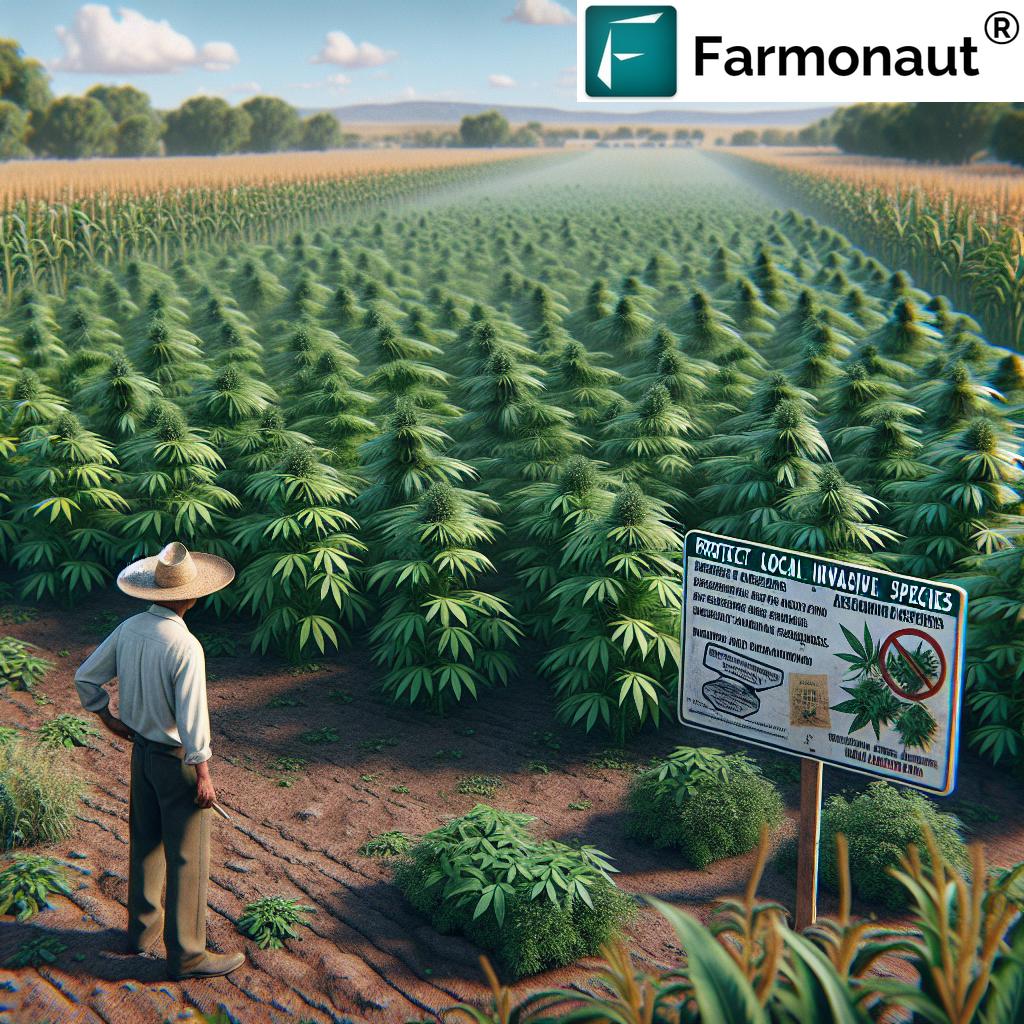Unsolicited Foreign Seeds New Mexico: Top Ecological Risks
“Over 50% of invasive plant species in New Mexico originate from unsolicited foreign seeds, threatening local biodiversity.”
Overview and Key Statistics: Why Unsolicited Foreign Seeds Threaten New Mexico
Have we ever wondered how a mysterious seed package in the mail could pose a grave threat to our local agriculture and environment? In recent years, communities across New Mexico have faced an alarming surge in unsolicited foreign seeds arriving unexpectedly, often with no clear sender or purpose. While these innocuous-looking seeds may appear harmless, they harbor risks that endanger our native plants, threaten the productivity of our farms, and undermine the diligence of local farmers.
New Mexico’s agriculture is a cornerstone of the local economy and heritage. The intrusion of unknown, often exotic, foreign seeds into the ecosystems of our state amplifies concerns over invasive species, plant diseases, and economic fallout. It is essential for us to understand the origins and dangers of these seeds, the regulations governing them, and, most importantly, what actions we must take to protect our community and environment.
This blog aims to deliver a comprehensive, actionable, and educational guide to every New Mexican:
- Tracing the origins of unsolicited seed shipments to countries like China and how they evade regulation
- Describing the risks of planting unknown seeds in New Mexico’s unique ecosystem
- Providing clear steps for reporting suspicious seed packets to NMDA
- Sharing best practices to protect local agriculture and ensure a sustainable future
Origins of Unsolicited Seed Shipments: How Do Foreign Seeds Enter New Mexico?
The mystery behind unsolicited foreign seeds often begins with an unexpected delivery. Many residents report receiving unmarked or poorly labeled seed packets, frequently postmarked from foreign countries such as China. According to the New Mexico Department of Agriculture (NMDA), in 2020 alone, 224 such seed packets were collected and analyzed, with several identified as noxious weeds—plants capable of outcompeting and devastating native species (hpj.com).
The true origins of these shipments often remain obscure. Sometimes, they are part of online fraud schemes such as “brushing,” where sellers create fake sales and product reviews using real addresses. In other cases, these packages represent illegal attempts at the unauthorized importation of plant materials—a direct violation of both federal and state regulations governing imported seeds.
- Most unsolicited seeds arrive via international mail, often disguised as “jewelry” or “toys.”
- Packages may lack information about seed type, plant species, or possible pathogens contained inside.
- Even when a seed packet appears benign, it can conceal invasive plant species or harmful plant diseases that are not native to New Mexico.
The NMDA tracked a renewed surge of these packages in 2025, underscoring the ongoing risks posed by foreign seed infiltration (nmdeptag.nmsu.edu).
Ecological & Agricultural Risks of Invasive Plant Species in New Mexico
The hidden dangers associated with unsolicited seed packages in the mail extend beyond immediate curiosity. The introduction and spread of invasive plant species in New Mexico carries profound risks, not just for individual landowners, but for all of us who depend on a healthy, productive environment and agricultural sector. Let’s unpack the most critical ecological, economic, and legal concerns associated with these foreign seeds:
1. Invasive Species: How Foreign Seeds Outcompete Native Flora
Unidentified seeds from foreign countries often have aggressive growth traits, allowing them to overtake native plant populations. Once invasive species become established, they can:
- Outcompete local flora, causing a loss of biodiversity and endangering unique New Mexican plants
- Alter the structure of natural habitats, displacing wildlife species and disrupting ecological balance
- Trigger expensive management costs for landowners, public agencies, and conservation groups
2. Pathogens and Plant Diseases: Preventing Plant Diseases from Imported Seeds
Many seeds are vectors for pathogens—fungi, bacteria, and viruses unknown to New Mexico’s agriculture. These can infect both native and cultivated plants, causing:
- Widespread plant disease outbreaks in crops and wildlands
- Potential introduction of quarantine-level diseases
- New threats for farmers, with crop losses and increased disease management challenges
3. Economic Consequences: Agricultural Impacts of Invasive Species & Disease
The economic consequences ripple through the entire agricultural community:
- Reduced crop yields due to displaced or diseased plants
- Higher management costs for field cleanup, eradication, and disease control
- Threats to New Mexico’s agricultural economy, which relies on the integrity of its native species
“New Mexico agriculture loses an estimated $10 million annually due to invasive plants introduced by foreign seed packages.”
4. Ecological Imbalance: Risks to Habitat, Wildlife & Biodiversity
Invasive species change the natural trajectory of ecosystems:
- Altering habitats that support native wildlife
- Reducing available food and nesting sites for many animal species
- Disrupting the delicate balance between plant, animal, and soil communities crucial for healthy soils and water systems
Legal and Regulatory Considerations for Imported Seeds in New Mexico
The importation of plant materials, seeds, and packets into the United States, especially New Mexico, is tightly regulated to prevent the entry of invasive plant species and harmful plant diseases. Both federal (USDA, APHIS) and state (NMDA) authorities strictly monitor seed imports.
Major Legal Concerns:
- Violation of Federal and State Regulations: Unauthorized receipt, distribution, or planting of foreign seeds is illegal under the USDA Plant Protection Act and New Mexico seed laws.
- Penalty and Enforcement: Violators may face investigations, fines, and seizure of materials as penalties for breaching imported seeds regulations.
- Traceability & Identification: Authorities require robust tracing and identification of any foreign seed packets. Rapid reporting and non-intervention are critical.
According to the NMDA, the mere receipt of unsolicited foreign seeds does not violate laws—but it is essential to keep the seed packet and report it promptly.
(Source: NM Department of Agriculture)
Recommended Actions for Reporting Suspicious Seed Packets
When we encounter seed packages in the mail from unfamiliar sources, a few simple but crucial steps can help prevent the spread of invasive plant species and protect New Mexico’s ecosystems:
- Do Not Plant the Seeds: Never sow seeds from unknown origins, regardless of their appearance.
- Preserve All Materials: Keep the seed packet, packaging, and all labels intact for investigation.
- Document: Take photos of all seeds and packaging as evidence.
- Report to NMDA: Notify the New Mexico Department of Agriculture as soon as possible:
- Email: ddlabs@nmda.nmsu.edu (Include pictures)
- Phone: 575-646-1551
- Online Form: NMDA’s Unsolicited Seed Package Form
-
Mailing Address:
New Mexico Department of Agriculture | Laboratory Division
Attn: Tim Darden
MSC 3 LD / P.O. Box 30005
973 Agriculture Way
Las Cruces, NM 88003-8005
- Never Share, Trade, or Dispose of Seeds in Trash or Compost: This helps prevent accidental sprouting or wider spread in the environment.
Download the Farmonaut App to monitor your field’s vegetation health, detect crop stress, and safeguard your yields via satellite-based insights—without the need for expensive hardware.
Try Farmonaut for web and mobile.
Comparative Risk Assessment Table: Top Invasive Seed Species and Ecological Impacts
Effective management of unsolicited foreign seeds in New Mexico requires us to distinguish high-risk species and their likely impacts. The table below summarizes major threats identified in recent seed interceptions.
| Seed Type/Origin | Potential Invasive Plant Name | Estimated Spread Rate (acres/year) |
Ecological Threat Level | Possible Impact on Local Crops | Recommended Action |
|---|---|---|---|---|---|
| East Asia (China) | Cogongrass (Imperata cylindrica) | 10–50 | High | Chokes crops, increases wildfire risk | Report & destroy seeds, monitor fields |
| Central/Eastern Europe | Giant Hogweed (Heracleum mantegazzianum) | 5–15 | High | Outcompetes forage, hazards for livestock/humans | Contact authorities, never plant |
| South America | Horseweed (Conyza canadensis) | 2–10 | Medium | Reduces crop yields, herbicide resistant | Isolate & report for analysis |
| Asia (China, Korea) | Kudzu (Pueraria montana) | 15–50 | High | Smothers cultivated fields, climbs structures | Destroy, do not compost |
| Mediterranean | Common Ragweed (Ambrosia artemisiifolia) | 3–7 | Medium | Reduces seed and hay yield, allergenic pollen | Send to NMDA, do not plant |
Note: This table provides examples of species known or suspected to arrive via unsolicited seed packages in the mail. Early identification and reporting are vital to avoid long-term ecological and economic harm.
Leveraging Farmonaut for Sustainable Agriculture in New Mexico
Given the increasing risks posed by unsolicited foreign seeds and invasive plant species in New Mexico, integrating technology into traditional agriculture is no longer optional—it’s essential.
Farmonaut offers transformative tools for farmers, agribusinesses, and even local authorities to monitor, predict, and manage risks related to both crop health and environmental hazards:
- Satellite-Based Crop Health Monitoring: Detect vegetative stress caused by invasive species or pathogens early on. This allows us to take timely actions and protect our yields. Access the Farmonaut Platform Now
- AI-Based Advisory Systems: Receive real-time alerts and best practices for management in the face of changing threats—empowering farmers throughout New Mexico.
- Blockchain-Based Traceability: Strengthen the transparency of your agricultural supply chain to comply with imported seeds regulations and boost consumer trust. Explore Farmonaut Traceability Solutions
- Fleet Management: Coordinate your farm vehicles intelligently and safely, reducing operational costs—critical when battling fast-spreading invasive or diseased fields. Optimize Fleet Management on Your Farm
- Resource and Carbon Footprint Management: Track your farm’s carbon impact—vital for sustainable agriculture in New Mexico, especially as we fight to keep our ecosystems balanced. Discover Farmonaut Carbon Footprinting
- Financial Verification for Crop Loans & Insurance: Let local farmers enhance credibility and reduce insurance fraud with satellite-verified claims and crop insurance. See Crop Loan & Insurance Features
Farmonaut’s subscription-based, affordable offerings empower New Mexican farmers to monitor, protect, and restore their fields with just a mobile device or browser.
Try out Farmonaut’s API for developers or API documentation to build custom local solutions.
Public Awareness: Protecting Local Ecosystems from Foreign Seeds
Public cooperation and vigilance are the bedrock of New Mexico’s defense against the spread of invasive plant species and pathogens. Here is how we, as a community, can make a meaningful difference:
- Stay Informed: Regularly follow updates from the New Mexico Department of Agriculture (NMDA) and reliable news sources regarding seed importation and regulations.
- Report Promptly: Even if you suspect a seed packet is “harmless,” always choose to report rather than ignore or experiment.
- Promote Local Flora: Support nurseries and seed providers specializing in native plants and avoid purchasing exotic seed species from unknown online sources.
- Educate Neighbors: Share knowledge about the risks of planting unknown seeds and the correct actions to take. Consider organizing community workshops or digital awareness drives.
- Monitor Fields & Gardens: Use modern tools, like Farmonaut’s satellite crop monitoring, to detect visible changes in vegetation cover that could indicate invasive species.
By working together, we help protecting local ecosystems from foreign seeds and uphold the sustainability of our land, crops, and livelihoods.
FAQ: Unsolicited Foreign Seeds and Ecological Risks in New Mexico
Q: Why do people receive unsolicited foreign seed packages in the mail?
A: Often, these packages originate from overseas sellers (notably in China and other countries) engaging in scams or violating imported seeds regulations. Some are linked to “brushing” schemes, while others are illegal attempts to circulate exotic or invasive plants.
Q: What are the main environmental risks of unsolicited foreign seeds?
A: The main risks are the introduction of invasive plant species, spread of foreign plant diseases, displacement of native flora, and lasting damage to wildlife habitats and ecosystems.
Q: Is it legal to receive or plant these seeds?
A: Recipients are not legally at fault for being sent seeds, but it is illegal to plant or distribute foreign seeds and materials without proper authorization. Always report suspicious seed packets to the NMDA.
Q: How can I help prevent further risks?
A: Never plant unknown seeds, keep all packaging/delivery details, and report any suspicious seed packets directly to state authorities. Share information on the dangers of these packets to help keep your local community safe.
Q: Are there tools to help monitor potential invasive species on my land?
A: Yes, we recommend Farmonaut’s crop health monitoring platform for early detection of vegetative anomalies which could indicate invasive plants or disease outbreaks. These insights help protect both small and large-scale farms.
Conclusion: Working Together for a Resilient New Mexico
Unsolicited foreign seeds pose a clear and present danger to our state’s agriculture, ecosystems, and economy. As recipients and stewards of the land, our collective vigilance—through reporting suspicious seed packets, refusing to plant unknown seeds, and spreading awareness—forms the frontline against ecological imbalance and agricultural disruption.
- Stay alert for seed packages in the mail and act responsibly.
- Use technology like Farmonaut to detect and manage risks on your property.
- Support local efforts to protect native plant species, wildlife, and habitats from invasive threats.
By taking united, informed actions, we create a safer, more sustainable environment for current and future generations of New Mexicans. Remember, the protection of our agriculture and natural heritage is in our hands—let’s answer the call with responsibility and proactive care.
For more information on sustainable farming, crop monitoring, and best practices for New Mexico farmers, check out dynamic resources like Farmonaut’s Farm Management Platform and stay vigilant with the latest in agricultural technology.


















